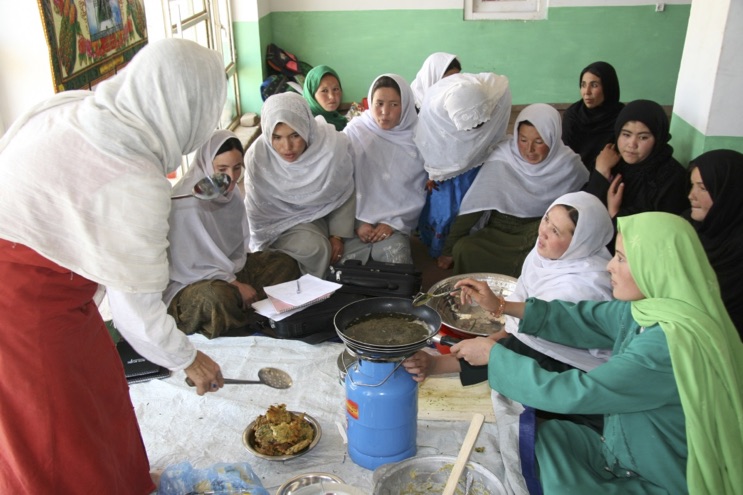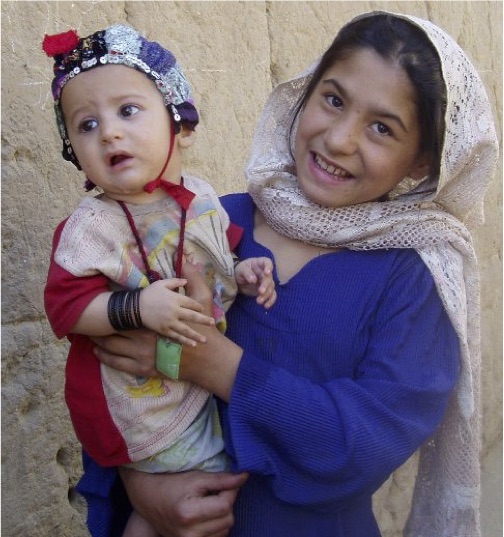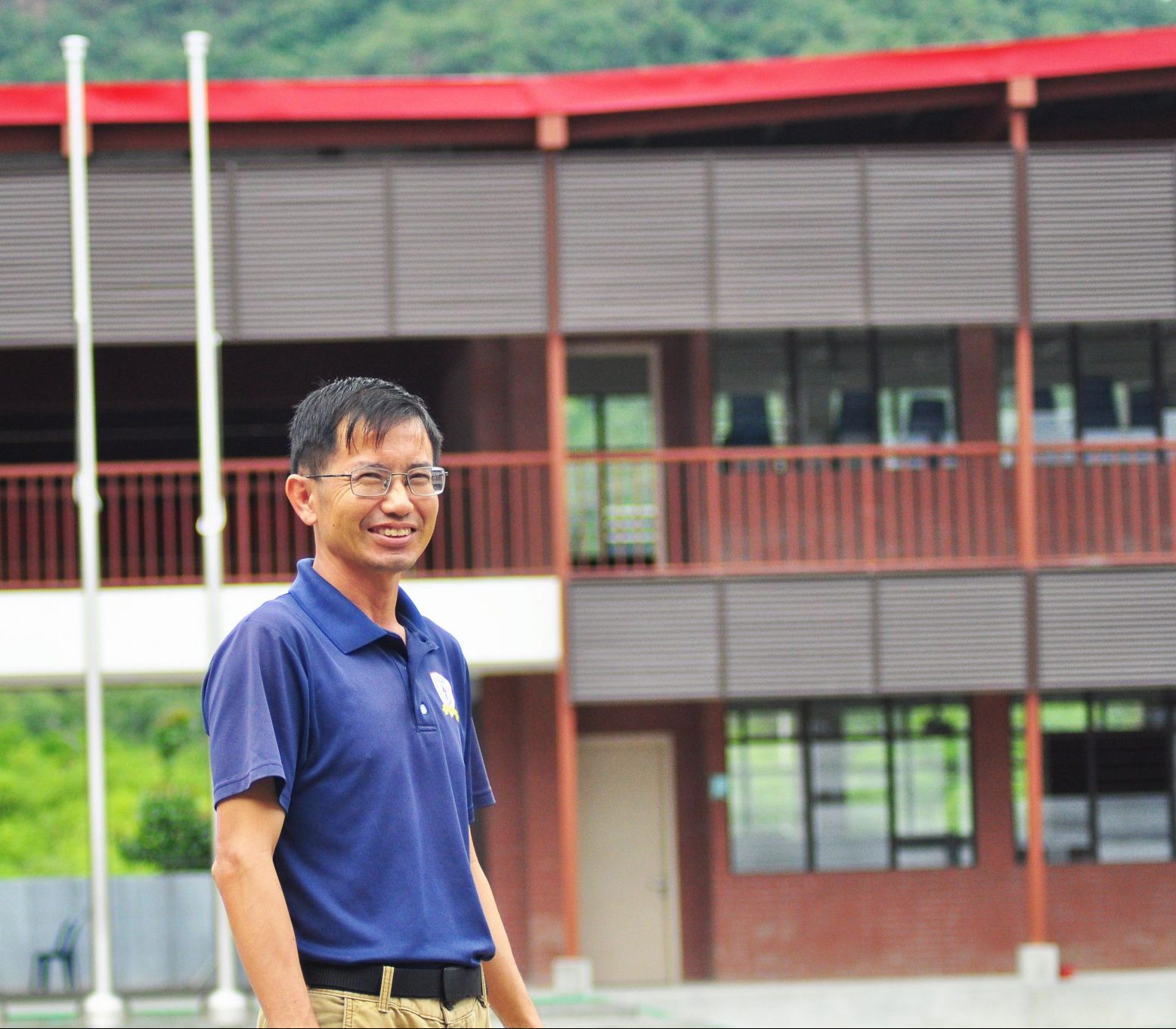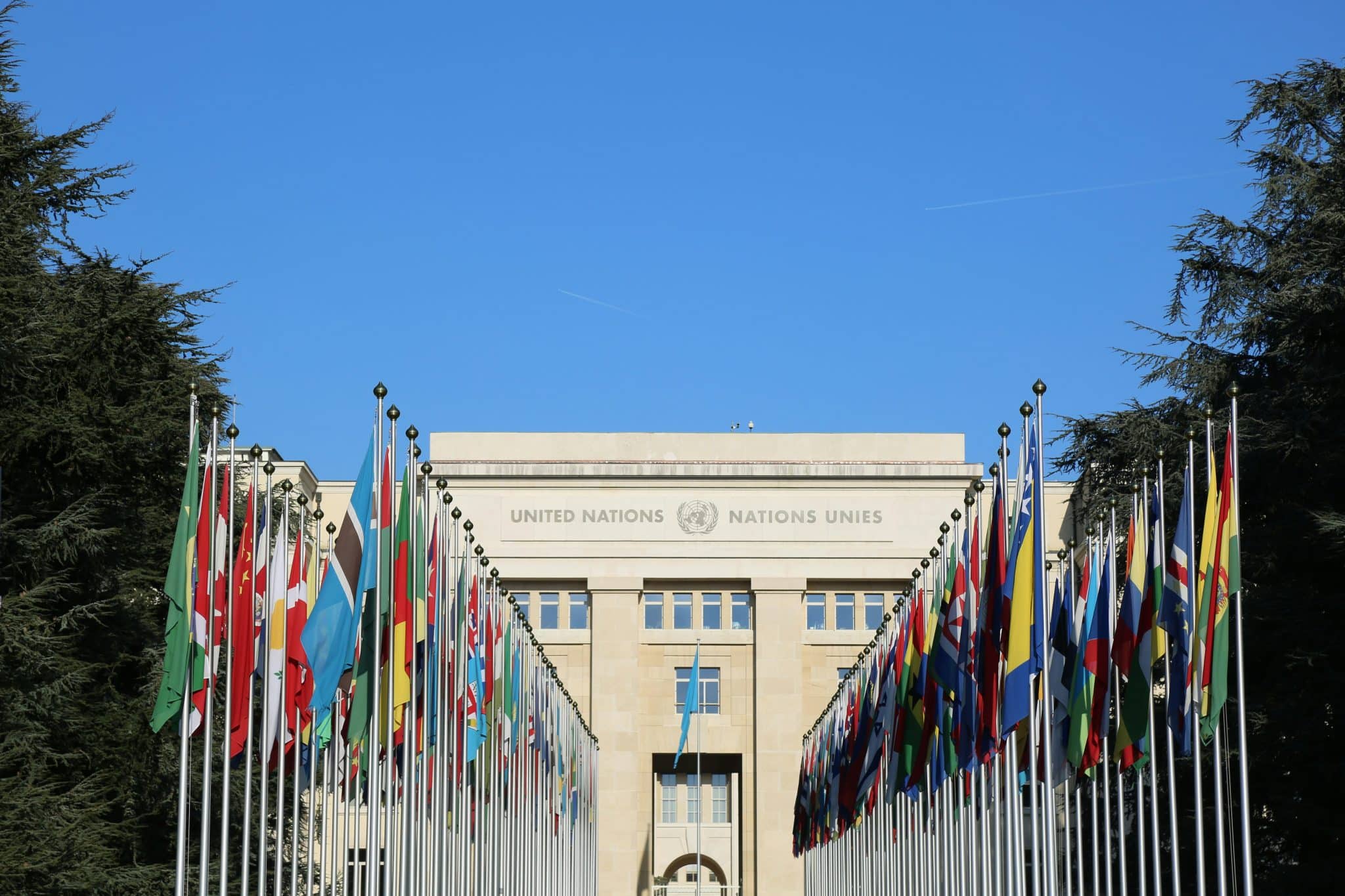“They want to kill me, they have to get God’s permission”: The feisty Singaporean missionary who is known to terrorists
Angels, God's messengers of truth and light, still walk amongst us today. This Christmas, Salt&Light brings you the moving stories of five "Angels in our Midst".
by Juleen Shaw // December 22, 2019, 5:51 pm

“The Taleban didn't know that if they torture me, they cannot break me," says Em (in red), seen here giving cooking demonstrations to mothers in war torn Afghanistan. Photos courtesy of Em.
Not many Singaporeans can say they have crossed the Taleban and survived.
But Em* can.
If you are picturing a Singaporean James Bond, you’d be wrong.
Em is a missionary and a woman who is all of 1.5m, with no defensive capabilities to speak of.
Ask how she defended herself against the fundamentalists in Afghanistan, and the petite 63-year-old retorts: “My machine gun is here”, pointing to her mouth. “I shoot-shoot-shoot-shoot with my mouth!
“In those days I went about with my face unveiled and the men would stare. I scolded them, ‘You go and pray and then you gawk at women.’ I spoke the local language and used words that most foreigners would not know how to use. The men were stunned. And they ended up saying, ‘Do you want us to walk you home?’”
“For me to give my life to God is nothing, because God gave my life back to me.”
But this was in the early 2000s. Things are likely to be dangerously different now, she warns.
The story of how this feisty, single, female missionary came to not just stand up to, but befriend, dangerous extremists in a country notorious for being one of the worst places to be a woman, is summed up by Em herself:
“It was God. I always thought I would work with women and children, but God led me to be friends with these fierce men – 20 of them sat down to have a meal with me. They asked me, ‘Why do you think people change political allegiances so easily?’ I said, ‘Some of you men, if you could sell your mother you would!’ Instead of getting angry, they said, ‘You know us very well!’
“My friend, who had spent most of her life in Afghanistan, told me, ‘They understand that you scold out of love.’
“I think they could see that I’m somebody who was there to help. But I also think they saw God. Because it is really not in me to have the courage to scold men with guns.”
Scars within
Em was born into a tough childhood. Her parents were in an unhappy marriage.
“My mother turned to gambling and smoking, and when she came home she would vent her frustration on me and sometimes my younger brother as well,” recalls Em, who has two younger siblings. By the age of eight, she was taking care of both the housework and her siblings while their mother went gambling.
She was occasionally whipped and had her head banged against the wall. Knowing that Em loved reading, her mother threw her books into a fire. When Em tried to stop her, she was shoved into the fire as well, burning her leg.
“The burns were superficial, but the scars are within.”
“The Taleban didn’t know that, if they torture me, they cannot break me.”
By the age of nine, Em was suicidal. She took a rope into the toilet, intending to kill herself. But she thought about her father, whom she occasionally had to defend against her mother.
And she thought about God. She had attended a Christian kindergarten, where she had first heard about Christ.
“Since then, I had been searching for God,” Em says. “Even at a young age, I had a hunger for God, a hunger for the meaning of life.”
The thought of an omniscient God stopped her from suicide.
“That’s why for me to give my life to God is nothing, because God gave my life back to me,” she says simply.
“Looking back, the hardship was part of God’s training for me so that I could become resilient.
“The Taleban didn’t know that, if they torture me, they cannot break me.”
Paving the path
Em became a believer in her teens, when a secondary school teacher took her to church.
After her ‘O’ levels, she decided that, with her unstable home life, it was best for her to be self sufficient. So she decided on vocational training in nursing.
At the back of her mind was the vague idea that if God were to call her into missions, a nurse would be useful in the field.
There was another job that God impressed upon her during her time on Doulos: Learn to forgive your parents.
To her disappointment, there was a surplus of general nurses in Singapore in the 1970s, and she was channelled into dental nursing instead.
Little did she realise that God was paving her path to hard places.
For six years, Em was a school dental nurse, treating both children and adults.
During that time, she attended a Navigators meeting and the speaker challenged his listeners, asking who would take the Gospel to unreached peoples in the Middle East.
To her surprise, Em stood up and said: “I will.”
“When people are established in their career, with a stable paycheck, often that’s when God tells you, ‘Okay, it’s time’!” she muses.
In 1983, at the age of 27, Em quit her job and signed up for two years on the Operation Mobilisation (OM) ship, MV Doulos, which was sailing around the world to offer knowledge, help and hope to different communities.
A loving Father
On Doulos, where all the mission-trippers on the ship served one other, Em had various roles, including assisting the dentist in the clinic. She observed how he treated impacted teeth, dislocated jaw and various other conditions which, unknown to her, she would later be called to perform as a missionary.
She was also the first woman to work in the ship’s bakery, hauling 20kg bags of flour despite her slight frame.
“As I served God, God was healing me and teaching me that there is such a thing as a loving Father.”
There was another job that God impressed upon her during her time on Doulos: Learn to forgive your parents.
“When I accepted Christ as a teenager, one of the things that God taught me was to forgive. But that forgiveness was superficial,” reflects Em. “On Doulos, God gave me dreams, memories of what happened in the past, from when I was as young as three years old. I remembered how my father stood by, not protecting me when my mother attacked me. And I realised that I had not fully forgiven him.
“So as I served God, God was healing me at the same time. He was teaching me that there is such a thing as a loving father – He is my loving Father who cares for me. He assured me over and over that I am precious to Him. He reminded me that He has redeemed me (Ephesians 1:7) and bought me with a price (1 Corinthians 6:20).
“Two verses that were precious to me were Matthew 23:37 – like a hen gathers the chicks, God also gathers us – and Isaiah 43:2 that says that when we go through the fire and deep waters, He is with us.
“Even when my life was in danger later on, my trust in God was never shaken.”
Road to Pakistan
When God called her into missions, Em asked: “God, what about my family? How about my father and my mother?”
“God told me, ‘You go and do your part, I will do my part’.”
Shortly afterwards, her father, and then her mother, became Christians.
Her father converted just a few years before he passed on and his was the first Christian funeral in Em’s family.
After her graduation from theological school, Redcliffe College in UK, Em’s first assignment with a mission agency* was to Quetta, on the Pakistan-Afghanistan border.
“Even though life was not easy in Quetta, God allowed me to flourish. He made me for hard places.”
More recently known as a Taleban stronghold, Quetta was not a peaceful place even in the 1990s, as tribal tensions were rife and curfews were common.
“Women could not take public transport in those days, and I learnt to drive a jeep even though I had no licence,” says Em. “It was the only way that I could move around.
“The Dutch man who taught me to drive also taught me to make repairs. So I would stop and lift the jeep hood whenever I needed to. The local men were shocked. Driving was challenging – roads were bad and sometimes so narrow that there was a 1-inch leeway on either side.”
In Quetta, Em worked at the dental clinic in the refugee camp, performing dental operations that she had observed the dentist perform on Doulos.
“Even though life was not easy in Quetta, God allowed me to flourish. He made me for hard places where people need God.”

When God told her to go to Afghanistan, Em cried out: “God, people are leaving Afghanistan, the embassies are closing down!” And God said: Go anyway.
After two years, Em heard God’s call to Afghanistan, where a civil war was raging and the needs of the people for simple medical attention was great.
Em cried out: “God, people are leaving Afghanistan, the embassies are closing down! You are asking me to go against the current!
“And God said to me, ‘Do you believe that among the 12 spies to Canaan, two of them said that if God is with us, we can possess the land?’ (Numbers 14:6-9) I said, ‘I believe.’”
So Em, a single woman on God’s mission, travelled to Kabul by herself.
In Kabul she would come to know, first-hand, the smell of gunfire and bombs.
Falling bombs
When Em arrived in Afghanistan in 1993, she was asked: What do you want us to do with your body if you die? Do you want to be buried here or sent home?
“So I went in prepared to die,” says Em. “Later on, I would see some of my friends buried in the local cemetery and it really hits you: That could be me.”
Arriving in Kabul, Em discovered that, even greater than their need for dental care, the people needed basic nourishment.
When Em arrived in Afghanistan in 1993, she was asked: What do you want us to do with your body if you die?
“I ended up working in a mother-child health clinic. I was out of my element. But a missionary told me, ‘I have a word from the Lord for you: He will give you the wisdom you need. And he read to me from Proverbs 2.
Em, who had developed a knack for thinking out of the box, devised a plan to reach Afghan mothers in order to give them health advice.
She started free cooking demonstrations.
With the aid of a nutritionist from Nepal, Em used high protein rice flour, corn flour and chick peas beneficial to the malnourished children.
“I introduced small changes, telling them how to cook nutritious food economically, food that they were familiar with, like pakora, spinach with egg, Indian curry.”

Afghanistan is believed to be one of the most dangerous places in the world for women.
The political unrest was so severe that there were only 20 missionaries in Kabul.
“We got very close because we went through a lot of danger together,” says Em.
On January 1, 1994, as the friends were ringing in the New Year with a party, bombs started falling. The house had no bomb shelter, so the group crowded under the staircase.
Another time, Em was at the clinic and the fighting on the streets escalated so that she could not get home, and she took shelter at the clinic.
She heard later that, in the house opposite hers, two of her friends were almost raped.
“One of them fought so hard that she had to have 11 stitches.”
“My boss is God”
The danger she lived with on a daily basis was unimaginable: Suicide bombings were not uncommon. Her house was broken into by gunmen but, after a harrowing few moments, they left Em and her housemates unharmed. When she was visiting Pakistan, her house was also hit by a rocket, and again, she narrowly escaped harm.
She saw death from bombs and from guns, she passed through bullets to take food to the hungry. She went about the city without a burqa because the oppressed local women told her that, as long as she did, they felt hope. (It was not mandatory to wear a burqa at the time but there was increasing pressure to do so.)
Her fearlessness stemmed from the fact that “my boss is God”.
Once she scolded a man for gawking at her. Unexpectedly, other fundamentalist men at the scene turned on the gawker and beat him up.
“The tables were turned on these men who think nothing of scolding their mothers and beating their wives,” says Em. “One of my friends, an Algerian Christian, joked, ‘The Taleban don’t want you because they know you will scold them. They have probably put up your photo as an Unwanted person!”
Em is quick to add that it was God who “gave me the leeway”. Inexplicably, she passed through military checkpoints without the required papers. She was even invited into the homes of local men who sought her advice on social issues.
Her fearlessness stemmed from the fact that “my boss is God”.
But the toll was severe. In the 10 years that Em served in Afghanistan, she lost 10 friends, some of whom died from medical issues arising from the high stress, while others were killed.
Not afraid to die
After two years of service in Pakistan, and a decade in Afghanistan, Em was called to Delhi to work with Afghan refugees.
Poverty was rife. “When the refugees wanted to convert to Christianity, the first thing out of my mouth was not ‘Praise the Lord’, but, ‘Let me tell you three things: I don’t give money, I can’t give you job and I’m not taking you overseas. I expect you to trust God,” she says.
Her fearlessness was well known, and when non-believers asked in wonder: “Why are you not afraid to die?” she would take the opportunity to tell them about Heaven and give them a Bible. “I had a lot of opportunity to share the Gospel, not from a pulpit, but in creative ways.”
“Even when my life was in danger later on, my trust in God was never shaken.”
She also brought her cooking skills, and a French NGO flew her to a remote Indian village to train the villagers and conduct a survey on their lifestyle and dietary habits.
There, living conditions were basic – a mattress on the floor, non-flushing toilets, a generator that only provided electricity from 7 to 10pm.
She ended up travelling to many such villages for nutrition talks and demonstrations, and became a consultant of sorts.
After India, she returned to Kabul, where she was invited to come up with a healthy menu for patients at a Christian training hospital.
Closing the door
After 18 years in the field, God told Em: “Finish up here and go home. This door is closing for you.”
In 2009, Em left Afghanistan. In 2010, she heard that her name had been blacklisted in the country. A local convert had circulated a video of a Christian baptism, adding Em’s face to the footage.
“It’s okay,” says Em stoutly. “The video was shown many times on Afghan television, showing Christians worshipping God and singing Christian songs. It was a good advertisement!”
Some years later, she crossed paths with the man who had circulated the video and he told her: “The Taleban are looking for you.”
Em replied: “Tell them to ask God for permission if they want to kill me. My life is not in their hands, it’s in God’s.”
Servant of Jesus
Today, Em is back in Singapore with a missions agency, where she orientates and mentors new missionaries and conducts training. She is also invited to share her experiences at various churches.
Like some military expert, she can tell you how to navigate a hostage situation, what to pack in an evacuation bag, and what to do if you are kidnapped.
Ever drawn to the plight of refugees, she helps at a refugee camp in Kuala Lumpur once a month. Her knowledge of the Dari language is put to good use in communicating with Afghans, Iranians and Armenians.
She quips: “When people ask me what my job title is, I tell them: Servant of Jesus.”
Life back home has required a little adjustment – “I can drive against camel trains and bullock carts in Pakistan, but don’t ask me to drive in Singapore!”
Much of her time is spent taking care of her mother, who has dementia and health issues including high blood pressure, heart and lung problems. Em is now her mother’s main caregiver. (“My forgiveness is also my testimony. I don’t want to have any regrets in God’s eyes.”)
Without any CPF to fall back on, Em lives simply. But God’s provision has never failed her.
“My forgiveness is also my testimony. I don’t want to have any regrets in God’s eyes.”
“Many years ago, I read a book by Pearl S Buck where missionaries were described as unattractive. I said, ‘God, I don’t want to be like that. I want to make you proud that you look after me!’” Em relates.
“True enough, even people’s hand-me-downs to me are of good quality. Whenever I have a need, God has brought people to provide for me before I even ask. He is a God of abundance! Sometimes He even gives me too much and I bless others with His bounty!”
Friends also contribute to the care of her mother, who attends daycare at St Andrews Senior Care.
What words of wisdom would she share with those who have heard the call to missions?
Her reply is unhesitating: “Rely more on God.”
*Names of people and mission agencies have been changed or omitted for security reasons. If you feel led to contribute to Em or the work of her mission agency, please contact us at [email protected].
I was a failure but a family gave me a home; today I’m the National Director of YWAM Singapore
We are an independent, non-profit organisation that relies on the generosity of our readers, such as yourself, to continue serving the kingdom. Every dollar donated goes directly back into our editorial coverage.
Would you consider partnering with us in our kingdom work by supporting us financially, either as a one-off donation, or a recurring pledge?
Support Salt&Light



